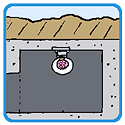|
shame on an IGA posted:this is the nerve center of an unspeakably complex robot. Man that sounds so awesome I wonder what it.... shame on an IGA posted:swiss lathe Oh 
|
|
|
|

|
| # ? May 15, 2024 22:36 |
chitoryu12 posted:The story of how a team was required to tell a company how their own petrochemical plant operated because they lost all the important files. For crying out loud, the words the author is looking for are 'records manager' and 'corporate archivist'. Information management is a real profession with real qualifications that help avoid these real situations. Of course, this means employing people, having a properly thought-out strategy and co-operating with it, rather than being eye-rollingly obstructive and - oh what's that? You've forgotten where you buried that pipeline and need to find the old records so that your heavy equipment doesn't smash straight through a mains pipeline it didn't know was there? /rant
|
|
|
|
|
Top Hamas Bomb Maker Killed in ‘Work Accident’quote:YERUSHALAYIM - A top Hamas terrorist was killed in an explosion in Gaza, Hamas announced Sunday. Mohammed Koka was the head of missile and bomb manufacturing for the terror group. He was severly wounded in an explosion in northern Gaza Saturday night, Hamas said. Hamas classified the explosion as a “work accident,” with the explosion ripping off several of his limbs, injuring him severely. He died shortly later in a Gaza hospital. http://hamodia.com/2017/02/05/top-hamas-bomb-maker-killed-work-accident/
|
|
|
|
Qwijib0 posted:Top Hamas Bomb Maker Killed in ‘Work Accident’ OSHA is harram
|
|
|
|
lmao
|
|
|
|
Mycroft Holmes posted:OSHA is harram Over here it's kosha.
|
|
|
|
Hyperlynx posted:I feel that a lot of software development is similar, where there's code nobody's touched for ten years, it's not documented or is poorly documented, stuff that seemed like a good idea at the time now looks strange and unconventional, and you just have to reverse engineer it to figure out how it works. I have a friend who works at some sort of firm that writes code for nuclear power plants. One of their customers is Japan's nuclear power company. They have to keep multiple PC-88 and 98s in storage for... some kind of certification, I think it was? I don't think they really have a plan if they all stop working at once. Volcott fucked around with this message at 22:13 on Feb 5, 2017 |
|
|
|
https://twitter.com/spectatorindex/status/828234422923063298
|
|
|
|
https://www.youtube.com/watch?v=rOijb3JPCe4
|
|
|
|
shame on an IGA posted:Older discussion, but I just want to point out that this isn't a network closet. The orange and green cables are for Siemens servo drives, one is power and the other control data. The purple ones are RS-485 Profibus data bus cables, and this is the nerve center of an unspeakably complex robot. Uh excuse me that's "PROFIBUS" not "Profibus". Also which is better over Ethernet PROFINET or MODBUS-TCP? Also GOOSE (Generic Object Oriented Substation Event)
|
|
|
|
zedprime posted:
Are you saying there is direct manipulation of third party database data over excel going on because ..... How is your rollback done in case someone selects all and hits a big ol' delete? Also lockouts a problem?
|
|
|
|
zedprime posted:ASPEN goes so far as to let you import Excel spreadsheets for custom simulation programming (because the alternative is scripting in a C variant, javascript, etc. and that's a lot rarer of a talent in the industry). I've heard of ASPEN before, but don't know anything about it, so I can't really comment on it, though I believe we considered them competitors. Our stuff was focused on plant maintenance exclusively. To that end, it aimed to help build up an accurate picture of exactly what functional locations are in the plant, what the manufacturer and model is for that part, and if necessary what specific asset/serial number is installed in a location (for pressure sensitive valves mostly, as far as I know). Then you have bills of material, maintenance manuals and manufacturer's manuals, for a given model by a given manufacturer. Then you can define preventative maintenance plans for all your FooCorp brand #353 Cardinal Grammeters based on the manufacturer's recommendation. So, you can plan ahead for what maintenance when you send the technician out to do the maintenance, you can find ahead of time exactly what procedure docs and spare parts, and equip them accordingly. That's particularly important for things like oil rigs, where it's expensive to get the tech to and from site, so if they've got the wrong parts it's a huge waste of time and money. To get back to spreadsheets, that end of things is (for us) getting data into the system in the first place. Part of that is simple checking for mistakes or missing data (did you fill out the criticality field? Is the functional location tag actually a valid, existing tag?). Those rules are probably supposed to get defined at the start of a project for a new plant module or whatever, but it seems that they need to change over time instead. What if you thought at the start that all your pipes need to be colour coded red, green or brown, your spreadsheet has a dropdown box to enforce that, but then later on in the project you find out you actually need blue and yellow pipes as well? Or that you don't need brown ones after all? You've got to update the spreadsheet and make sure everyone has the new version, and is working with the new version, rather than simply changing the value in the one system everyone logs into, so that it's definitely correct and up to date for everyone. Part of it is also helping automate management of change, where you want to review the data with human eyes before you put it in the system, so the software had workflow capability built in. So instead of emailing around versions of Excel files and manually teaching who's approved what version of what, you get the system to pass on to the appropriate person the objects they need to approve. They can see all the data connected with those objects, including existing data in the system that's relevant to them, rather then only the data in the spreadsheet and what related info they can dig up manually. Finally, there's some degree of trying to keep track of what's actually, currently in the plant "as built" verses what's been designed to be changed, so that you don't try to do maintenance on bits that aren't there yet. Admittedly we didn't really support that part without some fiddling and custom work, though we should have. Anyway, if nothing else, centralising all the info in one database avoids overhead and mistakes from emailing copies of data around.
|
|
|
|
Volcott posted:I have a friend who works at some sort of firm that writes code for nuclear power plants. One of their customers is Japan's nuclear power company. They have to keep multiple PC-88 and 98s in storage for... some kind of certification, I think it was? I don't think they really have a plan if they all stop working at once. CANDU power plants run the reactor power regulation program on PDP-11 minicomputers. They've been out of production by Digital Equipment Corporation (which also no longer exists) for a while so new PDP-11s are built by a third party on license for replacements or new plant builds. I'll bet you could have new computers of any kind made if you have enough money riding on them.
|
|
|
|
Wait. New plant builds still use PDP-11's?
|
|
|
|
Maybe eventually the Raspberry Pi can get nuke certified? I was at a rewind shop that did nuclear work (coolant pump motors, etc) and literally everything that involved nuclear work had to be tracked separately. I mean like tracking the tools used, materials used, even seemingly stuff like the brand and lot of bolts and washers. Everything was physically locked away in a separate storage area.
|
|
|
|
I work for a Japanese measurement company and they have a range of radiation proof sensors like loadcells. Special cables and glues are used, everything else is much the same.
|
|
|
|
you want something dead simple and reliable for important applications like nuclear power plants.
|
|
|
|
spankmeister posted:Wait. New plant builds still use PDP-11's? Aint' broke/don't fix and all that.
|
|
|
|
Nobody wants to be the dude responsible for thousands of deaths and his entire industry vanishing in the blink of an eye.
|
|
|
|
It's not even that no one is willing to do it, it's economics and the fact that it isn't necessary. Selecting new hardware and writing new software and then getting it approved by the regulator would probably also be more expensive than having new PDP-11s made. And we already know that they work and they do everything that's needed and are qualified for the job. I can't think of a single way to justify replacing the computers on the existing design. Even a new design should favour something that's proven over something that's new as long as it can do the job. I don't care if smartphones have thousands of times more computing power, it's not like you're rendering 3D graphics or decoding MP3s on a control system. BattleMaster fucked around with this message at 02:55 on Feb 6, 2017 |
|
|
|
https://www.youtube.com/watch?v=Nl07BrckR10 https://www.youtube.com/watch?v=xGo1PRvFlWA
|
|
|
Three-Phase posted:Maybe eventually the Raspberry Pi can get nuke certified? BattleMaster posted:
This is the reason, at least in the states. Getting the NRC to approve any sort of upgrade, no matter how minor, is nearly impossible and requires a mountain of paperwork and testing to prove to them that it won't suddenly destroy the reactor. Even if it's something as simple as "we want to change this dial from analog to a digital readout." The teaching reactor at my university has been in the same configuration since the 60s, and another school with the same model reactor tried to upgrade their reactor to digital instrumentation. They have been out of operation for nearly two years at this point. The maximum thermal power we're licensed for is five watts, so it's not like these things are going to hurt anyone if something goes wrong, they're like the nuclear version of an easy bake oven.
|
|
|
|
|
Remember to drain your smoke detectors every few years, or the smoke build up could leak out.
|
|
|
|
BattleMaster posted:Selecting new hardware and writing new software and then getting it approved by the regulator would probably also be more expensive than having new PDP-11s made. And we already know that they work and they do everything that's needed and are qualified for the job. That about sums up the entire industry. The newest plant, Watts Bar Unit 2, went into commercial operation ~4 months ago. They started building it in '72. I've heard, somewhere on SA probably, that it's basically impossible to pass NRC certification with new designs so we're stuck using 50+ year old designs forever or until the requirements change. Much like "Tylenol would never gain FDA approval if it were created today." Fakeedit: Olothreutes covered how difficult it is to make minor changes
|
|
|
|
C.M. Kruger posted:https://www.youtube.com/watch?v=Nl07BrckR10 https://www.youtube.com/watch?v=bIaUfBjHjpI (relevant, OSHA episode)
|
|
|
|
Random Encounter posted:Remember to drain your smoke detectors every few years, or the smoke build up could leak out. This is why you get a secondary smoke detector, in case the primary catches on fire.
|
|
|
|
http://i.imgur.com/Ho4ROMr.mp4
|
|
|
|
Doesn't Jay Kay wear funny hats in his music videos anymore?
|
|
|
|
Explained pretty well by the bottles that fall out of his pockets and make their way up the escalator after the first fall.
|
|
|
|
EVIL Gibson posted:Are you saying there is direct manipulation of third party database data over excel going on because ..... How is your rollback done in case someone selects all and hits a big ol' delete? Also lockouts a problem? It does create a problem with rollback and lockouts though, being a bunch of amateurs with stuff near the bottom end of what might be big data. That's what brought on the conversation originally, organizations having serious problems with living data finding a real home. ASPEN hopefully circulates as files covering major portions of processes or justifications of a swathe of equipment but I don't know I've ever seen it assigned an ID # in any doc control. Minitab even more fly by night because you generally want its graphics spit out for powerpoints and justification documents. SAP as mentioned has actual security in place and is the purest database experience I've ever had the opportunity to gently caress with. Credit where its due, by the time you are loving with stuff in Excel its usually far beyond the reaches of management of change and it exists in My Documents of people who are working at the time. If its on a network share, you are in constant threat of rollbacks by "oops delete" and lockouts involve bitching over instant messenger or walking across a site to smack someone across the head. Any collaboration is by virtue of administrative controls, and as safety culture is quick to demonstrate, please don't use administrative controls for anything you care about. Quick aside about why it doesn't all get codified by corporate code janitors, in a past life I interned writing quotes for distributed control systems. We used an Excel sheet certified by ISO that the proposal process was repeatable and data based in order to get government contracts. There was a project to turn it into a corporate program with management of change functionality on new equipment and equipment prices to get extra ISO brownie points. It took about half a man year from a manager in the proposal team and a year from a code team with PM, principal coder, and a rotating squad of incidental coders to turn the Excel sheets into something scripted. That's shitloads of dollars compared to an incremental cost of an intern or junior engineer doing legwork in Excel. Hyperlynx posted:I've heard of ASPEN before, but don't know anything about it, so I can't really comment on it, though I believe we considered them competitors. Our stuff was focused on plant maintenance exclusively. To that end, it aimed to help build up an accurate picture of exactly what functional locations are in the plant, what the manufacturer and model is for that part, and if necessary what specific asset/serial number is installed in a location (for pressure sensitive valves mostly, as far as I know).
|
|
|
|
*doesn't kill anyone, gets more years than serial killers*
|
|
|
|
well he COULDA killed someone,
|
|
|
|
I had a job which consisted of wrangling excel and SAP. As zedprime posts, excel is a shitheap for collaboration since your sheets could, if you were unlucky with syncronizing with the main server (nothing existed locally as such it was all just an image of what happened on the server and I don't know what this technology is called.) your documents suddenly either couldn't save or worse would tell you they were saved then immediately overwritten by another edit. SAP is as piece of poo poo. I get that it's useful for tracking large amounts of information, but it's just a beast to get information out of. Example: Sales data for Region must be extracted: 1) Find data using arcane two letter two digit command (Is this standard? Could just be internal CJs being dicks) 2) Find the correct data, click off tabs/areas/whatever you need 3) Press the right back key to get back to a previous view. There are three back buttons so good luck here. Pressing the right will get you forward, pressing the wrong one send you back to start. 4) Print -> Print type change A4 to file (could possibly be specified to xlsx or csv I don't recall) and printer tag to local machine Congratulations you now have a file to use. How this is a good way of doing business is beyond me. Maybe it's just SAP not having competition in the area of ... whatever this area is called. Business Intelligence? edit: A reddit user posted posted:SAP is designed to employ consultants, not to help you. But as IT, you aren't who they're selling to, they'll sell your execs and then shove it down your throat. edit edit: I also have a story of a sales person which while not OSHA as such certainly is a prime moment of "don't put this person in charge of system critical anything, they will gently caress it up". champagne posting fucked around with this message at 08:50 on Feb 6, 2017 |
|
|
|
Mycroft Holmes posted:you want something dead simple and reliable for important applications like nuclear power plants. BattleMaster posted:Aint' broke/don't fix and all that. Well yeah but at some point installing 40 year old computers becomes a problem because of parts availability and being dependent on one, maybe two companies in the world that can service your critical machinery. What if the company goes broke and there is a fire that destroys their warehouse or w/e? Or the last greybeard who really knows how the memory management works dies. In 2050 at the end of the life of the CANDU reactors the pdp-11 will be 80 years old. Granted, so will the rest of the parts of some of these plants but still.
|
|
|
|
spankmeister posted:Well yeah but at some point installing 40 year old computers becomes a problem because of parts availability and being dependent on one, maybe two companies in the world that can service your critical machinery. What if the company goes broke and there is a fire that destroys their warehouse or w/e? Or the last greybeard who really knows how the memory management works dies. NASA have this problem as they keep sending their computers far away. If I remember correctly they are in dire need of fortran programmers.
|
|
|
|
*Finally falls in a way that he's carried up the escalator after repeatedly tumbling down* "Oh thank gently caress" *falls into view again* "Goddammit"
|
|
|
|
spankmeister posted:Well yeah but at some point installing 40 year old computers becomes a problem because of parts availability and being dependent on one, maybe two companies in the world that can service your critical machinery. What if the company goes broke and there is a fire that destroys their warehouse or w/e? Or the last greybeard who really knows how the memory management works dies. And yet it's still cheaper to find someone to make new PDP-11s for you than to get a new digital control computer hardware and software design past the regulator. So it goes.
|
|
|
Boiled Water posted:NASA have this problem as they keep sending their computers far away. If I remember correctly they are in dire need of fortran programmers. My friend's PhD advisor (nuclear engineering) codes exclusively in fortran 77. He is aware that new languages exist, and that fortran has been updated. He does not care.
|
|
|
|
|
SAP scares me. It's like it was designed by people who love filling out tax returns. As it happens, our stuff was intended to synch with SAP, though that functionality didn't work very well (because SAP's API had long standing bugs they said they weren't going to fix). Anyway, as I understand it, quite often our stuff got used as a "staging area" for accumulating an sanitising data, with SAP being the actual one true source of info. We'd export data to be imported by the SAP guys. I honestly have no idea whether that works better or not than our stuff being the source of truth. Not that we could do all the other stuff SAP can do. And, ultimately, we hadn't solved the problem of data handover from the engineering/construction company to the operating company any better than anyone else. Our stuff was geared for the owner/operators.
|
|
|
|

|
| # ? May 15, 2024 22:36 |
|
spankmeister posted:Well yeah but at some point installing 40 year old computers becomes a problem because of parts availability and being dependent on one, maybe two companies in the world that can service your critical machinery. What if the company goes broke and there is a fire that destroys their warehouse or w/e? Or the last greybeard who really knows how the memory management works dies. There's those stories about how NASA used to scour eBay for chips to keep the Space Shuttle flying spog fucked around with this message at 10:10 on Feb 6, 2017 |
|
|










































